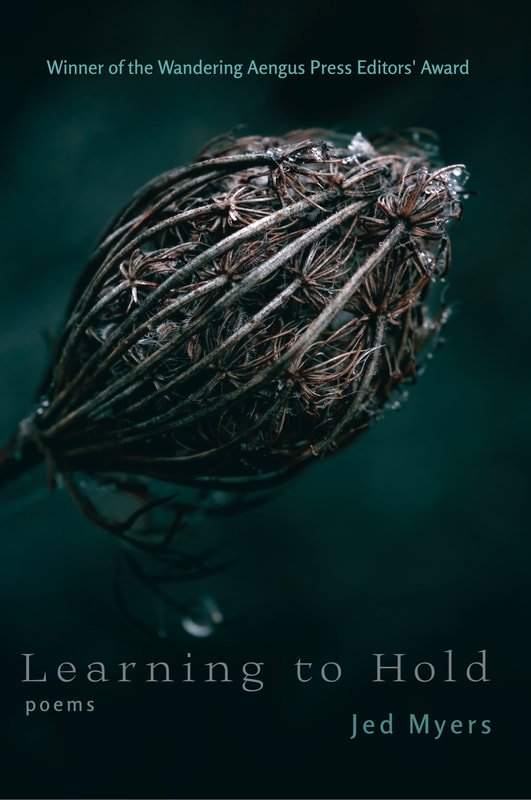Learning to Hold, a full-length collection from Wandering Aengus Press, 2024
In Jed Myers’ beautiful and bracing collection, Learning to Hold, we are invited to consider the trauma of war, genocide, and The Holocaust, how “What stories aren’t told are lived” and “Memories course the umbilicus.” Myers, situating himself as grandson, son, nephew, and father, dwells on the ways “murder gets into what’s grown,” while reveling in nature’s increasingly precious splendor. Despite the near-constant backbeat of the human predilection for strife, Myers revels in small moments of gratitude, reminding us “To stop / and honor the battered heads of the rushes,” and that “maples and firs … are never toppled to ground / till they’re ancestor old.” In these rhymical and reverential poems, ancestors sputter and flicker like guiding spirits. Fervent and musical, these are the poems I want to reach for as we “remain mingled / in our mother’s breath.”
—Martha Silano, author of Reckless Lovely and Gravity Assist
Jed Myers’ poetic power is the gale force that blows through the pages of Learning to Hold, as this poetry collection wrestles to grasp the whole of humanity’s complexity and brutality. A boy’s childhood begins as “memories course the umbilicus,” and the legacy of family “history held in raised hands, winces,/flinches, and those strange-lit dreams” gives way to a larger landscape of the broken and chaotic world, where “dreams find too much to hold.” But these are not dreamy poems. These poems slip in on gentle breezes but leave the reader wind-slapped, awakened in body and spirit. We feel these poems and trust the poet’s urging to “get out and love the world, take the road/west, cross the known’s edge, and trust/it isn’t all war zone, this flesh.”
—Heidi Seaborn, author of An Insomniac’s Slumber Party with Marilyn Monroe and Give a Girl Chaos
Learning to Hold is a breathtaking collection that can be best described in Myers’ own powerful words as “History held in raised hands, winces, / flinches, and those strange-lit dreams.” These poems take us on a journey, from the trauma endured by the poet’s ancestors in Eastern Europe through their flight across the water and into the present moment of delving into the ways where we come from haunt wherever we are. Myers interweaves his own sensory experience to his family’s, in “Her Winter Borscht,” his grandmother “… is my senses’ tie to where / I’m from.” Myers leaves us almost tasting the red of old-country beets and the violence it took to give them their color: “Still, the murder gets into what’s grown / in this ground too. The roots all know.” It is a collection that acknowledges profound, continual loss, “Someone’s gone. Sunset’s own wings / open to the edge of the world…” and yet the poems rise out from despair with perseverance, or dare I even say hope, reminding us, “You’ll go on.”
—Julia Kolchinsky Dasbach, author of The Many Names for Mother and 40 WEEKS
How does one learn to hold steady in a world at odds with the human need for stability, peace, and empathy? In Jed Myers’ collection Learning to Hold, this eternal question is explored. From moments of holding one’s own child to the realization that “gravity grounds us all in its democratic hold,” these poems reflect deeply on truths ranging from the brutality of war and racism to the wild grace in nature, dreams and memory. This work offers us its steadying hold in our whirlwind of longing, love, and loss.
—Tina Schumann, author of Praising the Paradox and Requiem: A Patrimony of Fugues
